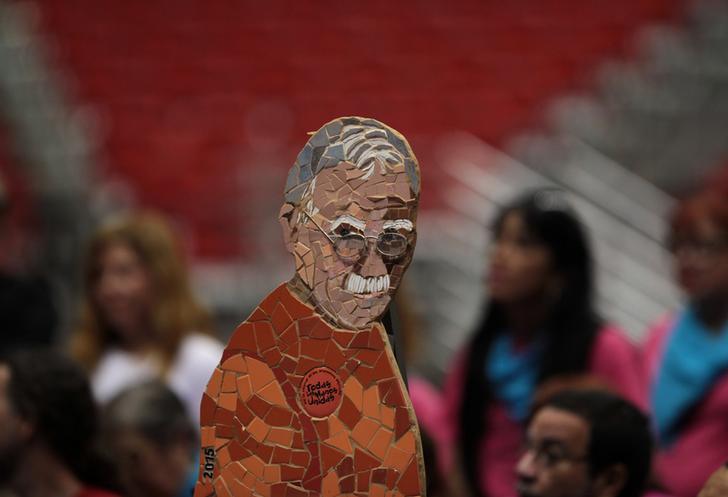President Trump, where do you stand on Puerto Rico — status quo, statehood, or independence?
A mosaic in the likeness of Puerto Rican nationalist Oscar Lopez Rivera is pictured at a news conference in San Juan, Puerto Rico on January 18, 2017. President Obama commuted the prison term of Lopez Rivera, who was sentenced to 55 years for his affiliation with Armed Forces of National Liberation, a Puerto Rican nationalist group known for its militancy.
Over President Donald Trump's first 100 days, we're asking him questions that our audience wants answers to. Join the project by tweeting this question to @realDonaldTrump with the hashtag #100Days100Qs.
#47. @realDonaldTrump, where do you stand on Puerto Rico — status quo, statehood, or independence? #100Days100Qs
Barack Obama made it one of his last actions as POTUS to pardon the sentence of Oscar López Rivera, a 74-year-old who was sentenced to serve 55 years in prison for his association with the Puerto Rican nationalist group Armed Forces of National Liberation.
Reacting to the news of his brother’s release, José López — who is the executive director of Chicago’s Puerto Rican Cultural Center — celebrated the pardon as a sign that the United States might move toward a “process of reconciliation with the Puerto Rican people.”
“The US has controlled Puerto Rico since 1898, and this message of President Obama to the Puerto Rican people is a message that we need to enter into a serious process of resolving the colonial quagmire, which is Puerto Rico.”
In June 2011, back when he still sat in the Oval Office, Obama traveled to San Juan. It was the first time a sitting president had made an official visit to Puerto Rico since John F. Kennedy visited the territory in 1961.
Obama said his administration would “stand by” Puerto Rico no matter what decision its people made about the territory’s status and its relationship with the United States.
It was a rather open-ended statement. While it is usually statehood that’s on the docket for Puerto Rico, Obama’s remarks seemed to suggest that he would also support Puerto Rico’s continued status as a territory of the US — or even as an independent nation.
While Trump remarked on Puerto Rico’s debt as a presidential candidate, he hasn’t had much to say about Puerto Rico’s status since he took office.
Currently, Puerto Rico — along with Guam, the Northern Mariana Islands, and the US Virgin Islands — is an unincorporated organized territory of the United States. This means that each of the nearly 3.5 million people who live in Puerto Rico are American citizens.
But Puerto Ricans don’t enjoy all the rights that stateside American citizens do.
For example, unlike American citizens in the 50 states, Puerto Ricans do not have full representation in Congress. Instead, Puerto Rico has a “resident commissioner.” Like Washington, DC’s non-voting members of Congress, Puerto Rico’s congressperson represents the island’s interests in the US House of Representatives but does not have the authority to cast votes on legislation.
Though Puerto Ricans living on the island can’t vote in US presidential elections, they do vote in nominating contests. During the Republican presidential primary, Trump received 13 percent of the vote in Puerto Rico — falling far behind Marco Rubio, who was the clear victor with a landslide total of 71 percent.
Their limited form of American citizenship has many Puerto Ricans clamoring for a reconsideration of the island’s status — including Puerto Rico’s new governor, Ricardo Rossello, who promised to advocate for statehood soon after he was elected in January.
In fact, Governor Rossello wants Puerto Rico to hold a non-binding referendum on its status. In June, residents will choose whether they want Puerto Rico to become a state or break from the US and form a new nation.
In just a few months time, Mr. President, the people of Puerto Rico will make it known where they stand: status quo, statehood or independence. Will you support their decision? If you wonder what the president thinks, click here to tweet the president.
